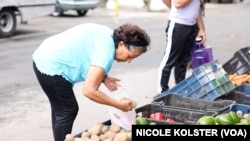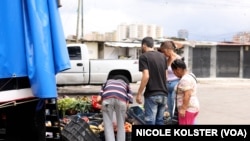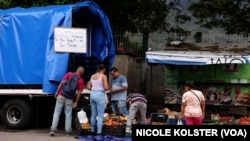“Fruits, vegetables and greens are exchanged for your products from the bag,” reads a blackboard placed on the side of a truck parked in a poor neighborhood of Caracas.
These are the controversial food bags from the CLAP program (Local Supply and Production Committees), which the Venezuelan government sells once a month at subsidized prices and which for years have been questioned for their quality and delay in delivery.
“Sometimes they come of very poor quality. Worms have come out of the rice (…) the flour sometimes comes like cobwebs,” she says to the Voice of America Judit de Machado, 70, who is at the front of the truck ready to exchange several of these subsidized foods for a few tomatoes and a little onion.
Read also: What are CLAP and why has the US sanctioned those responsible in Venezuela?
De Machado is a nurse and is retired and although she questions the quality of the food delivered by the government, she points out that they are “indispensable” due to the crisis.
Together with her husband, she is responsible for caring for and feeding her five grandchildren. “They spend the day with me and I make lunch for them.” However, she insists that these products “have been damaged and so no one wants to eat them in the house.”
Worms have come out of the rice (…) the flour sometimes comes like cobwebs.”
Like her, other people stop in front of the truck, read and continue… After a while, they return with shopping carts loaded mainly with flour that they bring from their homes. Everyone wants to exchange them.
On the floor there are baskets with pineapple, bananas, avocados, carrots, cassava, etc.
“It’s inedible,” says María Acosta, who is 67 years old. She refers to the precooked corn flour, which is used to make arepas, the typical Venezuelan dish, and which comes in these bags.
It is the first time that he goes to this truck, but he has exchanged food from his home before.
“They pass by my house changing (…) I exchange them for laundry soap (…) once I exchanged five kilos of flour for 500 grams of soap.”
This time, Acosta delivered 20 one-kilo packages of flour, for the equivalent of one dollar in vegetables.
“Many people grab these bags out of necessity,” explains Carmen Pérez, who also receives them every month.
It is an alternative to the low purchasing power and high cost of living in this country hit by chronic inflation and the constant depreciation of the local currency, the bolivar.
The CLAP bags or boxes were created in 2016 under the government of President Nicolás Maduro and in the midst of a serious economic crisis that resulted in historic figures of inflation and shortages, and also led to the collapse of the country’s social indices.
The program aimed primarily at vulnerable populations has also been marred by corruption scandals.
These bags include, in most cases, four kilos of flour, one kilo of rice, two kilos of pasta and three cans of sardines. They are not free. Judith and María paid 35 bolivars, which is equivalent to one dollar, and Carmen, 65, almost two dollars.
Alexander Díaz, spokesperson for a communal council in the sector, defends the social policies of the Maduro government.
“Every month there are social activities (…) We must be clear that we have a national attack on our currency, which has not allowed people to have an income to cover their needs and they think it is the government’s fault, but In reality this is a war that is directed from the outside,” he says. It is part of the official speech.
The official minimum wage in the public sector is 130 bolivars per month. The figure is barely equivalent to 3.5 dollars a month. A kilo of chicken, for example, today costs $3.88. The average remuneration in the private sector is much higher, at $210 per month, but also insufficient to cover food expenses.
““This is how people decide what to eat for the day.”
Every week, Óscar Cáceres travels 8 hours from the state of Trujillo to the capital, Caracas, to sell his vegetables. He has been receiving food from CLAP for a month, which he then also exchanges.
“You have to invent strategies to be able to sell, because sometimes people don’t have the money to cook with the seasonings and we provide them with that benefit.”
In a week he manages to collect on average one ton of these products (1,000 kilograms).
“There is a colleague who buys a bag (of 20 kilos) for $5, and I receive it the way they buy it from me. “I don’t earn anything from the CLAP product,” he tells VOA. He has worked as a farmer all his life.
“What I earn from is my merchandise (…) you have to invent strategies to be able to sell, because sometimes people don’t have the money to cook with seasonings and we provide them with that benefit,” he explains.
Cáceras says that it is common for people to opt for this option. “This is how people decide what to eat for the day.”
Susana Rafalli, food security expert and member of the NGO Caritas Venezuela, considers that “Venezuela is a nation in sharp decline in relation to global nutrition objectives. There are 6 million people going through this problem, a very high number that means we have a percentage of insecurity similar to that of Africa. From a nutrition point of view, the decline is absolute.”
“Charitable alms”
The United Nations rapporteur on the right to food, Michael Fakhri, stated last February that the so-called CLAP boxes “undermine the human dignity of recipients, have become susceptible to political clientelism and do not address the deep causes of hunger and poverty.” malnutrition in Venezuela, nor do they comply with the regulations on the right to food.”
From the testimonies collected, the expert highlighted irregularities in the operation of this program: sporadic supply, lack of nutritional values, suspension of the benefit at the discretion of the person responsible for the CLAP in the area and discrimination in delivery for political reasons.
“Some beneficiaries suggest that CLAP bags are treated as charitable alms and not as part of liberation from hunger,” said the expert.
Since 2017, the NGO Transparencia Venezuela has received more than 800 complaints related to irregularities in the operation of the CLAP program, which include overpricing, products in poor condition, resale of food, lack of accountability and use of the food bag for electoral.
Government promises to include proteins
In March, Maduro, who vehemently defends his program, promised to include protein in the bags.
“In 60 days I want to guarantee canned chicken meat, canned beef, beans and salt for our people,” said the president during an event to celebrate eight years since the creation of the social program.
“It was with the Clap that we defeated the war of the queues (rows),” he said.
Connect with the Voice of America! Subscribe to our channelsYoutube, WhatsApp and to newsletter. Turn on notifications and follow us on Facebook, x and instagram.
















Add Comment